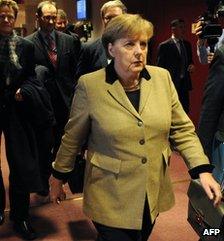The eurozone: Another step
- Published
- comments

Angela Merkel said the pact was "an important step"
Monday's summit was a victory for Angela Merkel, the German Chancellor. It was she who had pushed for a change to the EU treaty to enshrine greater discipline over national budgets. She did not get treaty change - David Cameron put paid to that - but she has a new set of rules backed by sanctions.
The Germans believe that these changes will bolster confidence in the single currency in the long term.
Only Britain and the Czech Republic have refused to join the 25 other EU members who backed the pact.
In December David Cameron had wielded his veto to stop these rules forming part of a new EU treaty which he thought could damage British interests. Back then he had insisted that if the euro-zone went ahead with a pact, EU institutions could not be used.
After last night's summit he said he would only challenge the use of the institutions if UK interests were threatened. He said he would be watching like a hawk, although some of his backbenchers are very unhappy with the softening of his position.
There are dark mutterings that David Cameron has been forced into making concessions by Nick Clegg, the Deputy Prime Minister.
The new pact should be signed , externalin March although there may be arguments in countries like Ireland over whether the people should get to vote on what is a significant step towards a fiscal union.
Much energy and argument has been spent on this agreement. It is questionable, however, whether it will have much influence on the immediate crisis.
Sony Kapoor of the Re-Define think tank, external says that "to the extent the fiscal compact may help increase support for tackling the euro-crisis amongst Germans and at the ECB, it may serve a useful role. In actual economic terms, it is largely irrelevant".
With Italy and Spain still in danger, EU leaders will discuss in March whether to increase the size of the new permanent bailout fund - the European Stability Mechanism, external. "We are getting the feeling that there is a shift in Germany's position and I am optimistic," said Italian premier Mario Monti.
The quiet hope is that Germany will prove more flexible having got its new fiscal pact.
In the meantime Greece remains of concern. There is still no agreement on a second 130bn euro bailout. Without it Greece faces bankruptcy. The rescue hinges on private investors accepting losses and the government making further cuts including losing 150,000 jobs in the public sector.
The Greek prime minister said last night that it was too early to say whether extra funding above what was in the bailout package might yet be needed.
It was doubts in Greece's ability to implement reforms that prompted the Germans to suggest an EU commissioner should effectively run the Greek economy. That caused fury in Athens.
President Sarkozy rejected the idea, saying Greece "is a sovereign country that has to do its work by itself". "There cannot be any talk of putting any nation under wardenship," he went on: "It would not be reasonable, democratic and efficient."
Greece appears close to a deal on restructuring its debt. Herman Van Rompuy, the President of the Council, called for a deal by the end of the week. Much will depend on how the ECB chooses to treat its own bond-holdings in Greece.
Even as the Greek marathon continues there are fresh concerns about Portugal and whether it will need a second bailout. Its borrowing costs have soared although most of its financing needs for this year have been met.
There would be the funds in the existing bailout fund to help Portugal but such a move would feed the suspicion that loans are in reality payments to periphery countries.
One final thought on the new fiscal pact. There is an irony here: it enforces restrictions on spending just when the EU is beginning to question whether austerity risks tipping countries into a spiral of decline.
Growth is the new watchword. Leaders like Mario Monti are challenging the German orthodoxy but, in the future, countries that are tempted to borrow more will have their hands tied.
A post-script.
German Chancellor Angela Merkel has apparently said she will support President Sarkozy in his re-election campaign.
Quite what Francois Hollande, the Socialist candidate, will make of all this is hard to say.
David Cameron was asked about the French president. He described himself as a "big supporter of Nicolas Sarkozy".
"He's a remarkable man," he said, "I am full of admiration for Nicolas".
It will be interesting to see whether such an endorsement makes its way onto President Sarkozy's campaign posters.